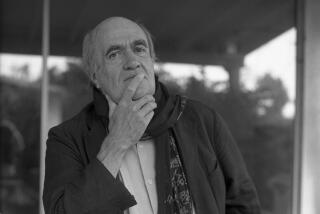Book review: ‘The Empty Family’ by Colm Tóibín
- Share via
The Empty Family
Stories
Colm Tóibín
Scribner: 277 pp., $24
Walking into solitude is not so difficult — even nowadays, with the digital contrails of voicemail and instant messaging. “I live alone now and I work hard,” writes a character in Colm Tóibín’s newest short-story collection, “The Empty Family.” “And when I am not working I am away. I do not see anyone I have no desire to see. It is easy to screen calls and avoid answering emails, and then they peter out.”
This last matter, this slow deletion of personal relationships, is at the core of the nine stories in this collection, as Tóibín projects a slideshow of reclusive figures, many of whom have found that a life well-hid is a life sufficient. With a spare, eloquent style, he guides us through hotel lobbies and pensiónes from Dublin to Barcelona. He directs our attention to estranged family members, divorcées and Muslim immigrants, catching each of them at the moment in which they are forced to reckon with their pasts.
These treks into the underpinnings of solitude are nothing new for the Irish author. Two previous novels, “The Story of the Night” and “The Master,” both dealt with sexual identity crises and hidden longings. The subject of “The Master,” the writer Henry James, makes a walk-on appearance in “Silence,” a story in which Tóibín imagines the circumstances surrounding a quotation from one of James’ notebooks. In the collection’s title story, a man returns to a coastal town in southeast Ireland and trains a telescope far out, toward the waves and “their dutiful and frenetic solitude, their dull indifference to their fate.” In “The Street,” we follow Malik, a Muslim barber’s apprentice in Barcelona, as he works his way up to selling phone cards and then cellphones for a shadowy boss named Baldy. Living in a small room with seven other men, he falls in love with one of them, but that is only the beginning of his troubles.
Loneliness is presented as a matter of course. If there is an ideal partner out there, perhaps avoidance is the best prevention. The middle-aged narrator of “The Pearl Fishers” who makes “enough money from the grim, almost plot-less thrillers with gay sub-plots I produce,” reluctantly accepts an invitation to drinks with Gráinne and her husband, Donnacha, old friends from school. Gráinne, once a fiery orator on the debate team, is now a popular religion-political columnist and a “fierce believer in the truth.” When she announces at dinner that she has written a tell-all book about her school-age affair with a priest named Patrick Moorhouse, it is all the narrator can do not to let slip that he and Donnacha too were carrying on after prayer meetings. Through the narrator’s reminiscences and his chilly affirmations at the story’s end we can see, perhaps, the beginnings of the erosion of his own self-righteousness.
This, however, could be giving his characters too much credit. In Tóibín’s world, no one is ever quite at home, even when they think they are getting close. In “The New Spain,” the not-so-young radical Carme returns to her familial home on the Spanish island of Menorca. Set just after the death of Franco, Carme revels in the freedom of roaming the seaside land that she remembers from her socialist youth. No longer the struggling student receiving a monthly allowance from her grandmother, she finds that there are other familial debts to be repaid. But isn’t family just another debt? Isn’t love a currency you simply spend until it runs out? By the story’s end Carme will have turned into a fully formed member of the bourgeoisie, dreaming of “an office with high windows” where a lawyer would “offer her good advice in correct, old-fashioned Catalan about how she should handle them all — her father, her mother, her sister Nuria.”
Ducker is a Los Angeles writer.
More to Read
Sign up for our Book Club newsletter
Get the latest news, events and more from the Los Angeles Times Book Club, and help us get L.A. reading and talking.
You may occasionally receive promotional content from the Los Angeles Times.










